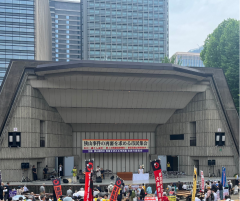Stateless minorities and discrimination against Dalit women and girls (HRC40, 2019, OS)
March 13, 2019
IMADR delivered the oral statement on “Stateless minorities and discrimination against Dalit women and girls” at the 40th session of the Human Rights Council. Whole text can be read below or download here. ![]()
———
IMADR Oral Statement: 40th session of the Human Rights Council
Item 3: Interactive dialogue with the Special Rapporteur on minority issues
13 March 2019
Speaker: Taisuke KOMATSU
Thank you Mr. President,
We thank the Special Rapporteur on minority issues for presenting his reports including the annual report.
We congratulate him for the last year’s successful Forum on Minority Issues which focused on disproportionate impacts of statelessness on minorities. We echo the Special Rapporteur’s concern on the risk of further increase of stateless people due to the recent migratory flows. We welcome the Special Rapporteur’s intention to develop guidelines to address this global issue. We strongly encourage him to incorporate actions outlined in the Global Compact for Safe, Orderly and Regular Migration[1] which provide concrete measures for ensuring the right to a legal identity and other human rights. Since statelessness is complex in nature, such guidelines should be developed through inputs from a broad range of stakeholders working on related areas.
We express our appreciation to the continuing attention of the Special Rapporteur to multiple and intersecting forms of discrimination against minority women including Roma and Dalit women. We are alarmed by a recent report from India which identified the prevalence of gender and caste biases in the justice system as well as sexual violence including rape against Dalit and Adivasi women by officials.[2] Last year, the Committee on the Elimination of Racial Discrimination (CERD) expressed concerns that the majority of Dalit girls in Nepal marry before the age of 15, exposing them to further human rights violations including sexual and domestic violence.[3] We encourage Nepal to swiftly accept the Special Rapporteur’s country visit request in order to strengthen the protection of human rights of minority women and men in the country.
Thank you Mr. President.
[1] A/RES/73/195
[2] National Dalit Movement for Justice (NDMJ-NCDHR) (2018), Criminal Justice in the Shadow of Caste, available at: http://www.annihilatecaste.in/uploads/downloads/data_190118030229_21000.pdf
[3] CERD/C/NPL/CO/17-23




